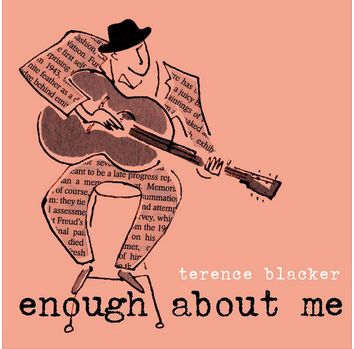Written by Simon Haines I have enjoyed Terence Blacker’s songs since I first saw him do a floor spot at The Everyman Folk Club about five years ago. I was immediately struck by how much his style of singing and guitar playing, as well as the subject matter of some of his songs reminded me of the great French chansonnier Georges Brassens. Other people have compared him to Jake Thackray; there are similarities, but I’d say Terence has the more laid-back, cool European style of Brassens. I love the way he pokes fun at the English middle-classes and their pretentions. Intentional or not, he seems to relish teasing listeners of a certain age - his and mine I suppose – by pointing out their lingering hopes or memories of romance, and their almost certainly doomed artistic ambitions. If younger people understood and applied his messages to their own situation they might be tempted to slit their wrists. Fortunately, they probably don’t believe it’ll ever happen to them.
I have enjoyed Terence Blacker’s songs since I first saw him do a floor spot at The Everyman Folk Club about five years ago. I was immediately struck by how much his style of singing and guitar playing, as well as the subject matter of some of his songs reminded me of the great French chansonnier Georges Brassens. Other people have compared him to Jake Thackray; there are similarities, but I’d say Terence has the more laid-back, cool European style of Brassens. I love the way he pokes fun at the English middle-classes and their pretentions. Intentional or not, he seems to relish teasing listeners of a certain age - his and mine I suppose – by pointing out their lingering hopes or memories of romance, and their almost certainly doomed artistic ambitions. If younger people understood and applied his messages to their own situation they might be tempted to slit their wrists. Fortunately, they probably don’t believe it’ll ever happen to them.
 Some of Terence’s older songs have certainly stayed with me; these include his greatest hit: Sad Old Bastards with Guitars, as well as I’d rather be French and The Young Girl with the Ukulele*. But here I’m considering his most recent recording, the 12-track Enough About Me. The first thing to say is that Terence is accompanied by a host of excellent musicians: Jon Loomes on violin, organ, ukulele, flute and backing vocals; Hugh Bradley on double bass, Murray Grainger on accordeon and shaker and Edwin Beasant on drums and harmonica. Together with Terence, Jon Loomes also recorded and produced this album. This “band” produce a great bluesy, jazzy sound which reminds me of one of my favourite retro French groups, Les Primitifs du Futur.
Some of Terence’s older songs have certainly stayed with me; these include his greatest hit: Sad Old Bastards with Guitars, as well as I’d rather be French and The Young Girl with the Ukulele*. But here I’m considering his most recent recording, the 12-track Enough About Me. The first thing to say is that Terence is accompanied by a host of excellent musicians: Jon Loomes on violin, organ, ukulele, flute and backing vocals; Hugh Bradley on double bass, Murray Grainger on accordeon and shaker and Edwin Beasant on drums and harmonica. Together with Terence, Jon Loomes also recorded and produced this album. This “band” produce a great bluesy, jazzy sound which reminds me of one of my favourite retro French groups, Les Primitifs du Futur.
This new recording begins with I can’t call my Baby ‘Baby’ - a wry reflection on the PC laws which try to govern how men are address women. Terence takes the opportunity to list all the these “twentieth century words” that he is not allowed to call his woman, including “honey bunch”, “pussy pie” and “snuggle-bum”.
In Disappear the depressed singer bemoans his earthly lot and seeks Lord Lucan-like freedom – possibly on another planet. Perched on his bar stool I can hear Terence singing “If I could write my story I’d call it “Fifty Shades of Blue”. Of course, we have to remember that this is not autobiography.
In First World Blues we’re confronted by the obvious stupidity of our petty daily concerns compared with the real grievances of Third World populations. The first verse of the song sets the tone:
I might take the blue pill, I might take the pink
Too much on my mind, too much to think,
I'm in deep, I can't get to sleep.
The Footsie is falling, the currency's weak
My holiday plans are all up the creek
I know, I'll turn on the radio.
They say that refugees are at the border again
Swarming like flies on my window-pane,
That grieves me in ways I can't begin to describe
They're spoiling my sleep, crashing my vibe,
It's no use -
I've got the first world blues.
In Marriage Song a husband suggests that his bored wife should have an affair “With some good-looking younger guy / He'll be slightly dumb / But with a pert little bum”. He pretends to be cool about it and predicts that the wife will in the end up settling more cosy middle-aged pleasures – but will she?
Track 5, The Thoughts of an Average Man, picks up the theme of The Young Girl with the Ukulele: the cynical thoughts of a failure contemplating the shallow, material success of a young entertainer whom he perceives as having little talent. The chorus says it all:
Not that I am bitter,
Not that I give a damn
I'm just sitting here in my old armchair
With the thoughts of an average man
An English Love Song is the kind of love song that a repressed stiff-upper-lip Englishman afraid to express his emotions might write. It’s a commentary on the difficulty we have when it comes to matters of the heart. It ends with a hint that there are feelings there, private feelings that do not need to be sung in public for all to hear.
There are hints of Latin, melodies and rhythms in Easy Listening which rejects all other musical genres; again we’re talking about the tastes of an average man of a certain age. In this song Terence takes a juicy but justified dig at folk music and those who run it:
Folk's too stuck in its folky ways
Too many lines, too many rules.
NB - I wasn’t going to describe every track like this, but these are such excellent well-crafted songs that I couldn’t help myself.
The Blues of ‘Blind Boy Wadding-Bruce is a funky blues song in its own right even though Terence is taking the piss out of English blues singers who bust a gut to sound like their American heroes. Blind Boy Wadding-Bruce (aka Terence Blacker?) has found a room in a pub where he can perform with his fellow bluesmen: Howlin' Wolf Perkins, Honeyboy Pilkington and Catfish Carruthers. What a band they must be! Perhaps we could book them for Folk East next year.
Complicated again targets the terminally twitchy male ego, men who, unsatisfied with their average life and desperate to be noticed, invent eccentricities to make themselves more interesting. Here’s one of the verses:
I want to be complicated
I'm going to share around my pain
I'll be all agonised and agitated
In my poor, fevered brain.
When you're feeling happy, I'll be in a mood,
I'll be underhand and over-sexed, foul-mouthed and crude.
Neglectful of my hygiene, weird about my food,
That's little old complicated me.
The Band Played On is a cute little rock ‘n’ roll song which could have come from the 1950s. It’s the story of musicians keeping going à la Titanic, but it’s also about keeping going whatever the circumstances.
The hippy idealism of the sixties and seventies is kept alive in Searching For That Heart Of Gold – with terminal romantics still hoping to find what they have spent their lives looking for. We’re taken back to those times by the musical references in the chorus.
And we're still searching for that heart of gold
In the windmills of our mind
We're still singing lie-la-lie-la-lie-lie-lie
And looking for the home we hope we'll find.
And if these are too subtle for you, try the last verse:
The times are a-changin', we used to say
It was true back then and it's true today
So let's sing a song of celebration
For my g-g-g-generation
Before we all f-f-fade away
How many listeners under the age of 50 will make any sense of the last two lines?
In the last song on the album I’ll be there with you the cynicism and piss-taking have evaporated and we’re treated to a gentle love song sung with genuine feeling.
This is an excellent album in every respect. The production is tasteful and never overdone. Terence’s guitar and voice are clear and never swamped by the accompanying musicians. But above all, these are great songs, some of which will last the test of time.
You can buy the physical CD from Terence's WEBSITE or from BANDCAMP, where you can also buy the download in its entirety or TRACK by track.
*
If you like the song The Young Girl with the Ukulele, you should try reading the short story of the same name which is available free from Amazon as a Kindle download. It’ll make you think again.

